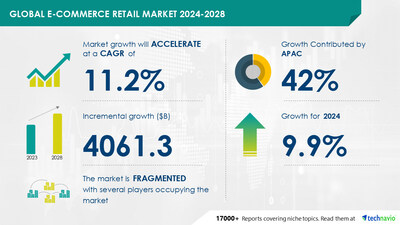E-Commerce Retail Market to Grow by USD 4.06 Trillion (2024-2028) as Personalized Shopping Emerges, AI-Driven Market Transformation Report – Technavio

NEW YORK, Oct. 30, 2024 /PRNewswire/ — Report with the AI impact on market trends – The global E-commerce retail market size is estimated to grow by USD 4.06 trillion from 2024-2028, according to Technavio. The market is estimated to grow at a CAGR of 11.2% during the forecast period. Advent of personalized shopping is driving market growth, with a trend towards integration of AI. However, strict regulatory policies related to compliance and customer protection poses a challenge.Key market players include Alibaba Group Holding Ltd., Amazon.com Inc., Apple Inc., Best Buy Co. Inc., Blink Commerce Pvt. Ltd., Coupang Inc., eBay Inc., Etsy Inc., Flipkart Internet Pvt. Ltd., Inter IKEA Holding BV, Manash E-Commerce Pvt. Ltd., Nykaa E-Retail Ltd., Otto GmbH and Co. KG, Rakuten Group Inc., Reliance Retail Ltd., Shopify Inc., Snapdeal Ltd., Target Corp., The Kroger Co., and Walmart Inc..
Key insights into market evolution with AI-powered analysis. Explore trends, segmentation, and growth drivers- View the snapshot of this report
|
E-Commerce Retail Market Scope |
|
|
Report Coverage |
Details |
|
Base year |
2023 |
|
Historic period |
2018 – 2022 |
|
Forecast period |
2024-2028 |
|
Growth momentum & CAGR |
Accelerate at a CAGR of 11.2% |
|
Market growth 2024-2028 |
USD 4061.3 billion |
|
Market structure |
Fragmented |
|
YoY growth 2022-2023 (%) |
9.9 |
|
Regional analysis |
APAC, North America, Europe, South America, and Middle East and Africa |
|
Performing market contribution |
APAC at 42% |
|
Key countries |
China, US, Canada, Japan, UK, Germany, South Korea, India, France, and Italy |
|
Key companies profiled |
Alibaba Group Holding Ltd., Amazon.com Inc., Apple Inc., Best Buy Co. Inc., Blink Commerce Pvt. Ltd., Coupang Inc., eBay Inc., Etsy Inc., Flipkart Internet Pvt. Ltd., Inter IKEA Holding BV, Manash E-Commerce Pvt. Ltd., Nykaa E-Retail Ltd., Otto GmbH and Co. KG, Rakuten Group Inc., Reliance Retail Ltd., Shopify Inc., Snapdeal Ltd., Target Corp., The Kroger Co., and Walmart Inc. |
Market Driver
The global e-commerce retail market is undergoing a major shift with the integration of artificial intelligence (AI). Notably, AI assistants are being introduced to enhance the shopping experience for consumers. For instance, Amazon launched an AI assistant named Rufus in August 2024, specifically designed for its Indian customers. Rufus offers personalized product recommendations, shopping list advice, and product comparisons, while also providing access to customer feedback. This assistant utilizes vast data, including product catalogs, community discussions, and customer reviews, to provide accurate and relevant recommendations. Retailers are increasingly relying on AI to optimize inventory management, predict consumer behavior, and personalize marketing efforts. These advancements aim to improve operational efficiency and customer retention rates. The use of AI in e-commerce is expected to expand further, with continuous improvements in machine learning algorithms and data analytics. Ultimately, AI integration in e-commerce is a significant trend that is transforming the industry, offering more personalized, efficient, and engaging shopping experiences, leading to growth and customer loyalty.
E-commerce retail market is booming with trends like online auctions, AI technologies, and voice recognition. Digital devices, including mobile phones, are driving the growth of this industry. Augmented reality (AR) enhances the shopping experience, allowing customers to virtually try on apparel and accessories. Personalized shopping experiences are a must-have, with payment gateways and digital wallets ensuring seamless transactions. Security features are essential to combat cybercrime and digital fraud. Headless architecture and content delivery networks streamline purchasing processes. Everyday basics and luxury items are popular categories, with internet penetration expanding the reach of e-retailers. Cross-border e-commerce is on the rise, with B2B and C2C marketplaces offering a hybrid solution. E-commerce platforms leverage mobile technologies for convenience shopping, voice orders, and AR experiences. Apparel and accessories, footwear, electronic goods, and smartphones are top-selling items. Data security remains a priority in this dynamic market.
Request Sample of our comprehensive report now to stay ahead in the AI-driven market evolution!
Market Challenges
- The global e-commerce retail market encounters various regulatory challenges, with each region imposing unique compliance burdens on businesses. In Japan, the Act on Specified Commercial Transactions (ASCT) and Act on Regulation of Transmission of Specified Electronic Mail (ARTSEM) regulate e-commerce practices, requiring operators to inform consumers about cancellation policies and prohibiting unsolicited emails. The Consumer Contract Act further restricts disadvantageous terms in service agreements. In India, concerns over festive season sales and their impact on small retailers have led to calls for stricter e-commerce regulations. China’s new regulations focus on online consumption, livestreaming sales, and personal information protection, adding significant compliance challenges. South Korea is considering stricter regulations on e-commerce platforms’ involvement in financial services to prevent payment failures. These regulatory measures aim to protect consumers but add complexity for e-commerce businesses.
- E-commerce retail market is thriving with the rise of online shopping, particularly on smartphones. Daily essentials and luxury products are popular categories, while cross-border trade presents new opportunities and challenges. E-commerce platforms must ensure data security, using mobile technologies and digital infrastructure. Business-to-Business (B2B) and Consumer-to-Consumer (C2C) transactions are common, with hybrid and pure marketplaces offering various benefits. Apparel, groceries, and tech devices are top sectors. Logistics and delivery services are crucial, as is cybersecurity for online transactions. Social media and e-commerce technology, including AI and machine learning, are key marketing tools. Banks and financial institutions facilitate account balances, money transfer, and online trading through digital payment methods. Inventory management, order processing, and payment integration are essential e-commerce technologies. Mobile applications and responsive websites cater to the growing use of smartphones.
Discover how AI is revolutionizing market trends- Get your access now!
Segment Overview
This e-commerce retail market report extensively covers market segmentation by
- Product
- 1.1 Apparel and accessories
- 1.2 Groceries
- 1.3 Footwear
- 1.4 Personal and beauty care
- 1.5 Others
- 2.1 Business to business (B2B)
- 2.2 Business to consumer (B2C)
- 2.3 Consumer to consumer (C2C)
- 3.1 APAC
- 3.2 North America
- 3.3 Europe
- 3.4 South America
- 3.5 Middle East and Africa
1.1 Apparel and accessories- The global e-commerce retail market for apparel and accessories is experiencing growth, fueled by several key factors. These include increasing affluence, the trend toward premiumization, and a shift toward organized retail. In India, the domestic lifestyle industry, including apparel, beauty, accessories, and footwear, is projected to reach USD210 billion by 2028. A significant driver of this growth is the Gen Z demographic, heavily influenced by social media trends. Their preference for online shopping is expected to increase, further propelling the market. Gen Z shoppers, known for their desire for the latest fashion trends and willingness to spend on premium products, are a crucial segment for e-commerce retailers. Major players in the industry, such as Ajio, are capitalizing on this trend. Ajio, the retail fashion arm of Reliance, launched Ajio Street in March 2023, offering a wide range of clothing and accessories at affordable prices. The platform aims to offer lower prices, waive delivery charges, and provide a hassle-free return process. The apparel and accessories segment in e-commerce is diverse, catering to various consumer preferences and price points. From affordable fast fashion to high-end luxury items, the market offers something for everyone. Effective use of digital marketing and social media influencers plays a pivotal role in shaping consumer preferences and driving online sales. The global e-commerce retail market for apparel and accessories is set for substantial growth. With the rising influence of Gen Z shoppers, strategic initiatives by major players like Ajio, and the effective use of digital marketing, this segment is poised to thrive in the forecast period. The focus on affordability, convenience, and trend-driven products will continue to attract a diverse and expanding customer base.
Download a Sample of our comprehensive report today to discover how AI-driven innovations are reshaping competitive dynamics
Research Analysis
E-commerce retail market refers to the buying and selling of goods and services online, including daily essentials, luxury products, and electronic devices such as smartphones, tablets, and computer devices. Online shopping has revolutionized the way we purchase items, offering convenience, accessibility, and a wide range of choices. Cross-border e-commerce enables consumers to buy from retailers in different countries. Mobile technologies, including mobile applications and responsive websites, have made online shopping more accessible than ever. E-commerce platforms provide inventory management, order processing, payment integration, and digital payment methods for seamless purchasing experiences. Business-to-Business (B2B) and consumer-to-consumer (C2C) transactions are common in the e-commerce market. Internet penetration continues to drive growth in the e-commerce sector, with voice orders and augmented reality enhancing the shopping experience. E-commerce offers a vast array of products, from everyday basics to luxury items, making it a dynamic and ever-evolving market.
Market Research Overview
E-commerce retail market is experiencing exponential growth with the rise of online shopping. Daily essentials, luxury products, and tech gadgets like Smartphones, Tablet devices, and Computer devices are popular categories. Cross-border e-commerce is expanding, bringing global access to local markets. E-commerce platforms leverage mobile technologies for seamless shopping experiences, while B2B and C2C marketplaces facilitate business transactions. Logistics and digital infrastructure are crucial for efficient delivery services. Data security and cybersecurity are top priorities to ensure safe online transactions. Social media integration and AI technologies like voice recognition offer personalized shopping experiences. E-retailers use payment gateways, digital wallets, and security features to process transactions securely. Retail e-commerce includes apparel and accessories, groceries, and electronic goods. Inventory management, order processing, and payment integration are essential components of e-commerce technology. E-commerce platforms are adopting headless architecture and content delivery networks for faster, more efficient purchasing. The convenience of online shopping, combined with the availability of digital payment methods and advanced technologies like AI, machine learning, and data analytics, make e-commerce an integral part of modern retail. However, challenges like cybercrime and digital fraud require continuous efforts to ensure a secure shopping environment. Internet penetration and the growing popularity of electronic commerce continue to drive market growth. The future of e-commerce includes voice orders, augmented reality, and headless e-commerce, offering a seamless shopping experience for consumers.
Table of Contents:
1 Executive Summary
2 Market Landscape
3 Market Sizing
4 Historic Market Size
5 Five Forces Analysis
6 Market Segmentation
- Product
- Apparel And Accessories
- Groceries
- Footwear
- Personal And Beauty Care
- Others
- Modality
- Business To Business (B2B)
- Business To Consumer (B2C)
- Consumer To Consumer (C2C)
- Geography
- APAC
- North America
- Europe
- South America
- Middle East And Africa
7 Customer Landscape
8 Geographic Landscape
9 Drivers, Challenges, and Trends
10 Company Landscape
11 Company Analysis
12 Appendix
About Technavio
Technavio is a leading global technology research and advisory company. Their research and analysis focuses on emerging market trends and provides actionable insights to help businesses identify market opportunities and develop effective strategies to optimize their market positions.
With over 500 specialized analysts, Technavio’s report library consists of more than 17,000 reports and counting, covering 800 technologies, spanning across 50 countries. Their client base consists of enterprises of all sizes, including more than 100 Fortune 500 companies. This growing client base relies on Technavio’s comprehensive coverage, extensive research, and actionable market insights to identify opportunities in existing and potential markets and assess their competitive positions within changing market scenarios.
Contacts
Technavio Research
Jesse Maida
Media & Marketing Executive
US: +1 844 364 1100
UK: +44 203 893 3200
Email: media@technavio.com
Website: www.technavio.com/
![]() View original content to download multimedia:https://www.prnewswire.com/news-releases/e-commerce-retail-market-to-grow-by-usd-4-06-trillion-2024-2028-as-personalized-shopping-emerges-ai-driven-market-transformation-report—technavio-302290581.html
View original content to download multimedia:https://www.prnewswire.com/news-releases/e-commerce-retail-market-to-grow-by-usd-4-06-trillion-2024-2028-as-personalized-shopping-emerges-ai-driven-market-transformation-report—technavio-302290581.html
SOURCE Technavio



